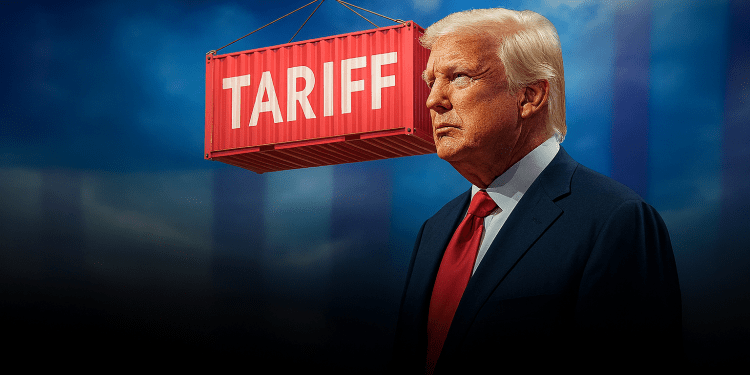Trade War Ignites: Trump’s Explosive Announcement
During a heated Washington D.C. press conference President Donald Trump revealed a major trade escalation through his decision to impose 30% tariffs on European Union and Mexican imports. The announcement from Trump caused global financial markets to experience severe disruptions while intensifying concerns about a complete trade war between major global economic powers.
The Tariff Breakdown: Why It’s a Global Game Changer
Watch: Full Report on Trump’s 30% Tariffs Impact
All imported goods from the EU and Mexico face a comprehensive 30% tax rate under this new policy which differs from previous selective tariffs targeting steel or automobiles. All EU agricultural products together with luxury vehicles and electronic devices and manufactured goods from Mexico will receive the same 30% tariff rate. This policy extends beyond Trump’s prior threats regarding Brazilian imports because it imposes the new tariff rate on every import from both the EU and Mexico.
Washington’s Justification: Fighting “Chronic Trade Abuses”
The White House claims that EU governments along with Mexico implement “chronic trade abuses” through their unfair industrial subsidies and wage suppression policies which Trump considers abusive. Trump declared, “America will no longer provide financial support to the world because our domestic industries remain in decline.”
Global Reactions: EU and Mexico Prepare for Retaliation
European leaders immediately denounced the decision without any delay. European Commission President Ursula von der Leyen announced immediate economic response measures which she described as decisive action to protect EU economic interests. The United States has chosen confrontation and we stand ready to respond.
The Mexican President condemned the decision while announcing that his administration would impose matching tariffs on vital American farm goods and machinery.
The financial markets worldwide immediately reacted to the news. The euro lost value against the dollar and U.S. stock market indices plummeted along with rising uncertainties in industrial metals and agricultural commodities markets.
From Targeted Tariffs to Economic Warfare
The current tariff wave extends beyond previous trade conflicts to create a substantial impact on worldwide business operations.
The recent decision marks a fundamental change from specific trade penalties to complete economic warfare. The current decision represents a distinct departure from Trump’s first-term trade disputes and early 2020s trade conflicts because it impacts comprehensive economic sectors and puts at risk the fragile worldwide economic growth that followed pandemic-induced disturbances and ongoing international instability.
Economic Experts Predict Global Impact
Economic experts predict substantial price growth in Europe while North America will face supply disruptions and long-term harm to U.S.-EU diplomatic relations. The IMF projects that a continued escalation of the trade war would cause global GDP to decline by 0.8%.
Strategic Timing: Why Trump Chose This Moment
The timing of this move appears deliberate according to various analysts. Trump’s presidential election cycle for 2026 has started so he strengthened his “America First” economic stance. The tariffs function as Trump’s method to maintain domestic political support through his confrontational stance toward foreign nations while using foreign economic conditions to explain national economic problems including inflation and industrial decline.
The political challenges Trump faces with European leaders regarding defense spending and Ukraine aid have created additional pressure between them. Through this tariff action Trump sends Europe a geopolitical warning that America under his leadership will restore its aggressive unilateral foreign policy.
The Bigger Picture: Are We Heading for a New Cold Trade War?
The recent developments show how global powers are moving toward economic separation in their relationships. The U.S. maintains an increasingly hardline stance against Europe but China pursues stronger relations with Russia and major Asian market partners. Europe now faces a need to reassess its transatlantic ties while pursuing Asian alliances through strategic partnerships with nations including Indonesia and Vietnam.
Multiple trade experts now predict that economic power will replace traditional military strength as the main instrument for geopolitical competition during this “New Cold Trade War.”
Economic Forecast: What to Expect in the Next 12 Months
The upcoming year will bring European economic instability through higher prices for consumers together with diminished industrial export volumes and decreased investor trust. The US market experiences volatility after Trump announced this tariff increase even though his base supporters support the move because European component-dependent industries such as automotive and tech sectors will experience negative effects.
Several multinational corporations will speed up their supply chain diversification plans by choosing Asian and South American routes for their operations.
Both EU and Mexican officials are preparing to defend against Trump’s 30% tariff through retaliatory measures which indicates diplomatic conflicts will persist for months ahead.
A Defining Moment for Global Trade
The 30% tariff decision by Trump creates a geopolitical earthquake which will transform economic alliances and put pressure on international relations and affect worldwide consumers. The world observes European and Mexican reactions to this move but the main question remains whether this marks the beginning of protectionist policies or a tactical move that will lead to beneficial trade agreements for the United States.
The upcoming year will experience historical trade tensions which demand preparedness from businesses and policymakers as well as consumers regarding major economic transformations.




